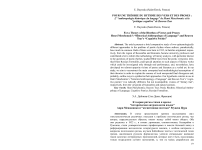For a theory of the rhythm of verses and proses: Henri Meschonnic’s “historical anthropology of language” and Reuven Tsur’s “cognitive poetics”
Автор: Deyneka Evelina
Журнал: Новый филологический вестник @slovorggu
Рубрика: Теория литературы
Статья в выпуске: 3 (38), 2016 года.
Бесплатный доступ
The article presents a brief comparative study of two epistemologically different approaches to the problem of poetic rhythm whose authors, paradoxically, have much in common. Both of them were born in 1932, in families originated, respectively, from the region of Bessarabia and Romania, became university professors and contributed a lot to reform the methodology of literary analysis, with particular interest to the questions of poetic rhythm, studied Bible texts from the poetic viewpoint, inherited from Russian Formalists, paid special attention to such aspects of literary works which could be investigated only through oral performance, and, nevertheless, have developed two almost opposite visions of poetry and literature as a verbal art. In our study, we aim to reconstruct the main conceptual and methodological assumptions of their theories in order to explain the reasons of such unexpected final divergence and, probably, outline ways to synthesize their approaches. Our hypothesis consists to see in Henri Meschonnic’s “historical anthropology of language” and Reuven Tsur’s “cognitive poetics” two radically different, but not incompatible, visions of “literary fact”, respectively, from the viewpoint of humanities and natural sciences.
Henri meschonnic, reuven tsur, poetic rhythm, historical anthropology of language, cognitive poetics, russian formalism
Короткий адрес: https://sciup.org/14914756
IDR: 14914756
Список литературы For a theory of the rhythm of verses and proses: Henri Meschonnic’s “historical anthropology of language” and Reuven Tsur’s “cognitive poetics”
- Meschonnic H. Critique du rythme: anthropologie historique du langage. Lagrasse, 1982
- Tsur R. Toward a Theory of Cognitive Poetics. Brighton; Portland; Toronto, 2008
- Deyneka E. Henri Meschonnic et le formalisme russe: rencontre, héritage ou déplacement des idées? // Glissements, décentrements, déplacement. Pour un dialogue sémiotique franco-russe. Digital Library of the University Paris 8. Saint-Denis, 2013. P. 188-197. URL: http://www.bibliotheque-numerique-paris8.fr/fre/ref/164239/COLN3/ (accessed 3.09.2013); Lilja E. Reuven Tsur. Poetic Rhythm. Structure and performance. An empirical study in cognitive poetics. 2nd ed. Brighton, 2012 (A review article) // Studia Metrica et Poetica. 2014. Vol. 1.1. P. 143
- Tsur R. Poetry Reading -Rhythmical Performance: Triple-encoding, and voice quality: Six case studies//Thinking Verse. 2012. Vol. 2. P. 88-111; Tsur R. Poetic Rhythm. Structure and Performance. An Empirical Study in Cognitive Poetics. Brighton, 2012
- Tsur R. What Makes Sound Patterns Expressive? The Poetic Mode of Speech Perception. Durham; London, 1992
- Дейнека Э.А. Теория «устности» Анри Мешонника // Живое слово: логос - голос - движение - жест / сост. В.В. Фещенко. М., 2015. С. 255-265; Meschonnic H. Qu’entendez-vous par l’oralité? // Meschonnic H. Les états de la poétique. Paris, 1985. P. 93-133
- Meschonnic H. Poétique du traduire. Paris, 1999
- Leopizzi M. Les sources du poème Meschonnic. Paris, 2009
- Meschonnic H. Le sacré, le divin, le religieux. Paris, 2016
- Tsur R. ‘Kubla Khan’, Poetic Structure, Hypnotic Quality and Cognitive Style: A Study in Mental, Vocal and Critical Performance. Amsterdam, 2006; Tsur R. On the Shore of Nothingness: Space, Rhythm, and Semantic Structure in Religious Poetry and Its Mystic-Secular Counterpart. A Study in Cognitive Poetics. Exeter, 2003
- Meschonnic H. Les états de la poétique. Paris, 1985. P. 41
- Tsur R. Toward a Theory of Cognitive Poetics. Brighton; Portland; Toronto, 2008. P. 1
- Tsur R. Toward a Theory of Cognitive Poetics. Brighton; Portland; Toronto, 2008. P. 1
- Meschonnic H. Pour la poétique. Paris, 1970
- Дейнека Э.А. Концепты лингвоантропологической системы Анри Мешонника//Под знаком «Мета». М.; Калуга, 2011. С. 235-236
- Meschonnic H. Les états de la poétique. Paris, 1985. P. 7
- Meschonnic H. Le signe et le poème. Paris, 1975
- Meschonnic H. Critique du rythme: anthropologie historique du langage. Lagrasse, 1982
- Dessons G., Meschonnic H. Traité du rythme: des vers et des proses. Paris, 2005
- Tsur R. Poetic Rhythm. Structure and Performance. An Empirical Study in Cognitive Poetics. Brighton, 2012. P. 17
- Meschonnic H. Critique du rythme: anthropologie historique du langage. Lagrasse, 1982. P. 216-217
- Фаликман М. Когнитивная наука: основоположения и перспективы//Логос. 2014. № 1 (97). С. 1-18; Brône G., Vandaele J. (eds.). Cognitive Poetics: Goals, Gains and Gaps. Berlin; New York, 2009
- Liu S., Chow H.M., Xu Y., Erkkinen M.G., Swett K.E., Eagle M.W., Rizik-Baer D.A., Braun A.R. Neural Correlates of Lyrical Improvisation: An fMRI Study of Freestyle Rap. // Scientific Reports. 2012. Vol. 2. Article 834. P. 1-8; Jacobs A.M. Neurocognitive poetics: methods and models for investigating the neural and cognitive-affective bases of literature reception // Frontiers in Human Neuroscience. 2015. Vol. 9. Article 186. P. 1-22
- Потапов В.В. Динамика и статика речевого ритма. Сравнительное исследование на материале славянских и германских языков. М., 2004


